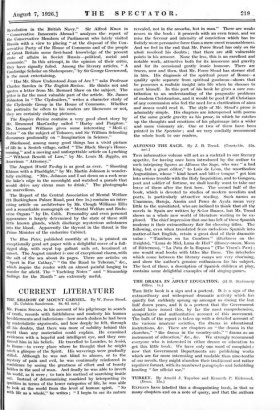CURRENT LITERATURE
THE SHADOW OF MOUNT CARMEL. By W. Force Stead. (R. Cobden Sanderson. 8s. 6d. net.) MR. FORCE STEAD, in his account of his pilgrimage in search of truth, records with faithfulness and modesty his human bewilderments and indecisions—how much shaken he had been by materialistic arguments, and how deeply he felt, through all his doubts, that there was more of nobility behind this world than any materialist could explain. He examined evidences with a hopeful and intelligent eye, and they con- firmed him in his beliefs. He travelled to Lourdes, to Assisi, to Rome—to every place where he thought that he might catch a glimpse of the Spirit. His waverings were gradually stifled.. Although he was not blind to abuses, or to the mystery of pain and evil, he was continually reinforced in confidence by seeing the greatness of effort and of beauty hidden in the soul of man. And, finally he was able to invert his world, as it were ; to turn his method of searching inside out. Instead of dehumanizing mankind by interpreting its qualities in terms of the lower categories of life, he was able to look at the world from the level of human spirit. " So with life as a whole," he writes ; " begin to see its nature revealed, not in the amoeba, but in man." There are weak.: nesses in the book : it proceeds with an even tenor, and we miss the fervour and intensity of conviction which has ins finitely more persuasive force than a mere sweet reasonableness. And we feel in the end that Mr. Force Stead has only on the whole resolved his doubts ; that there are still vulnerable points in his armour. None the less, this is an excellent and notable work, attractive both for its innocence and gravity and for its occasional gently ironic humour. There are traces, now and then, that Mr. Force Stead has sterner stuff in him. His diagnosis of the spiritual power of Rome—a quality quite separate from spiritual goodness—shows that he possesses a realistic insight into life when he chooses to exert himself. In this part of his book he gives a sure con- tribution to an understanding of the pragmatic problems of modern Christendom, and it would be good if all Christians of any communion who feel the need for a clarification of aims and means could read it. The style of Mr. Stead's prose is
admirably simple. His chapters are interspersed with poems of the same gentle gravity as his prose, in which he catches up the thoughts and emotions of his pilgrimage into a wider and more visionary air. One or two of them have been printed in the Spectator ; and we very cordially recommend the whole book to our readers.






































 Previous page
Previous page